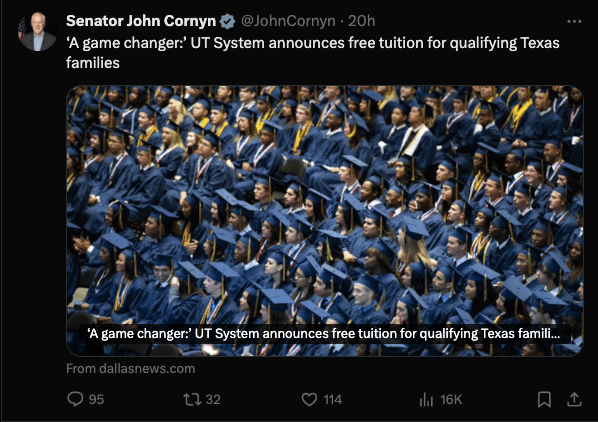(TEXAS SCORECARD) – Students with a family income of $100,000 or less will be eligible to receive free tuition at any of the University of Texas System’s nine academic institutions, the Board of Regents decided Thursday.
The Promise Plus program, which provides financial aid, was first implemented in 2022 to assist families at income thresholds of around $65,000.
This move by the UT System regents will now expand full-coverage tuition eligibility to a baseline of $100,000 or less.
According to the U.S. Census, the median family income in Texas is about $76,000.
The program is funded through the regent’s investments into Promise Plus endowments, and a “$35 million campus investment will come from endowment distributions, the Available University Fund, and other resources,” according to a UT System press release.
The Available University Fund consists of returns from investments in the Permanent University Fund. Put in the state constitution in 1876, the PUF consists of land set aside to support the Texas A&M and University of Texas Systems. Revenues these lands generate fund the PUF, including more than 2 million acres leased to oil & gas companies. Revenues from these companies’ wells are part of the funds that flow into the PUF.
To qualify for the program, students must first apply for federal and state financial aid, enroll as a full-time undergraduate student, and be a Texas resident.
“Funds from the Promise Plus endowment are used to augment existing need-based financial aid received by students through various channels, including campus tuition assistance programs, as well as federal and state initiatives,” Paul Corliss, a UT System spokesman, told Texas Scorecard. “Each UT institution administers its own Promise-related financial aid program, ensuring that students who meet the specified family income thresholds receive full coverage for tuition and mandatory fees.”
Corliss also stated that “the regents are investing more in the endowments that support the Promise Plus program in perpetuity, ensuring long-term financial support for future generations.”
U.S. Senator John Cornyn highlighted the regents’ move in a November 20 social media post.

Source: X
State Rep. Brian Harrison (R–Midlothian) posted that he sees the program as a way of the regents telling the Texas Legislature that UTS no longer needs taxpayer money. He also mentioned that the program could be used to fund free “LGBTQ Studies” degrees.
Harrison expressed discontent with the program, writing, “If Texas is going to socialize higher education and offer ‘free’ college for adults making $100k/year, the LEGISLATURE should decide that… not unelected executive branch bureaucrats.”
Harrison also published a letter he sent to the UTS Board of Regents, asking pointed questions about the constitutionality of the program. These questions included how much funding UTS received, and since the system appears to have “excess funding” if UTS would ask state lawmakers for a reduction in the monies they receive.
The letter was signed by Harrison, as well as State Reps. Steve Toth and Nate Schatzline, and incoming House members Janis Holt, Andy Hopper, Mike Olcott, Keresa Richardson, Brent Money, David Lowe, Helen Kerwin, and Wes Virdell.
However, lawmakers are far from the only Texans to express dismay at the planned spending.
“Free? Since when was it a $90,000 a year income considered poor,” Tarrant County resident Chandler Crouch told Texas Scorecard. “We should promote the heck out of that. The best thing that can happen is for everybody to sign up. This is also the easiest way to prove that the education is not valuable.”
Christie Slape, a Round Rock mother, pointed out additional flaws in the plan.
“It’s great for low income families to have the opportunity to send their child to college, but for people who make more than $100,000 and have multiple, college bound children, it doesn’t seem exactly fair or equitable as the left say,” Slape told Texas Scorecard.
Alicia Chmielewski, a real estate agent in Frisco, agreed.
“I find it upsetting and rather discriminatory that they would come out and say some people are eligible for free tuition while others aren’t. In a world where we are trying to bridge divides and create equal opportunities for everyone this only serves to divide further,” Chmielewski told Texas Scorecard.
“Like the old adage, ‘It’s not about what you make. It’s about what you keep.’ Families with more income usually have a higher debt burden as well. This decision seems like more of a PR stunt than a thoroughly considered solution to high education expenses.”
The program will go into effect next fall.


